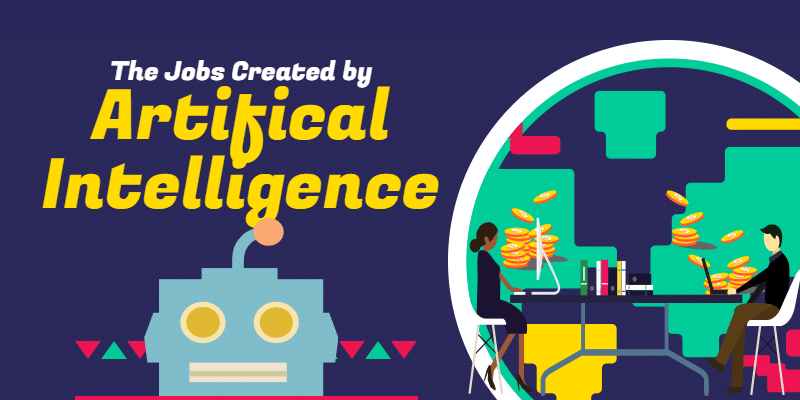Jobs Created by Artificial Intelligence: A Comprehensive Exploration
 Ahmed Raza
Ahmed Raza
The integration of artificial intelligence (AI) into the global economy has sparked transformative changes, giving rise to entirely new job categories. While AI automation may replace certain routine roles, it is simultaneously generating employment opportunities that require innovation, strategic thinking, and technical expertise. Here’s a detailed look at the burgeoning career paths emerging in the AI era.
1. AI Development and Operations Roles
AI systems require meticulous design, implementation, and ongoing support. This has led to the creation of specialized roles, including:
AI Engineers and Developers: These professionals design, build, and optimize AI algorithms and systems. They work on machine learning models, natural language processing (NLP), and deep learning networks, ensuring the technology performs effectively in real-world scenarios.
AI Trainers: To make AI systems more accurate and functional, trainers help refine models by providing targeted data inputs. This role is essential for developing voice assistants, image recognition software, and other AI tools.
AI Maintenance Experts: Ensuring ethical, unbiased, and reliable AI functionality requires constant oversight. Specialists monitor systems for errors, reduce biases, and adapt algorithms to align with social norms and organizational goals.
2. Data-Focused Careers
AI thrives on data, making roles centered around data collection, management, and analysis increasingly critical.
Data Analysts and Scientists: These professionals interpret complex datasets to extract actionable insights and improve AI systems’ predictive capabilities.
Data Labelers: AI training relies on vast amounts of labeled data. Data labelers tag and classify inputs like images, text, and audio, enabling AI to process and learn from them effectively.
Big Data Engineers: As AI applications grow, managing and processing large-scale data require engineers skilled in handling vast databases and optimizing storage systems.
3. Human-AI Interaction Experts
To make AI systems user-friendly and accessible, specialists who focus on improving interactions between humans and AI are in demand.
Prompt Engineers: With the rise of generative AI, professionals skilled in designing optimal prompts for these systems have become invaluable. Their expertise ensures accurate and useful AI responses tailored to specific needs.
AI UX Designers: User experience designers work on making AI interfaces intuitive, enhancing usability for applications such as chatbots, voice assistants, and automated systems.
AI Explainers: Translating complex AI concepts into understandable terms for non-technical stakeholders is crucial. These professionals act as mediators between AI teams and clients or organizational leaders.
4. Creativity and AI
AI's growing presence in creative industries is fostering new roles where humans and machines collaborate.
AI-Enhanced Creators: Writers, designers, and multimedia artists use AI tools to amplify their creativity, streamline processes, and produce innovative content.
Creative Strategists: These professionals guide the integration of AI into artistic endeavors, blending technology with human ingenuity to create impactful results.
5. Industry-Specific Roles
Certain sectors are leveraging AI in ways that demand unique skill sets:
Healthcare AI Specialists: Medical professionals now work with AI to enhance diagnostic precision, develop personalized treatment plans, and manage patient care efficiently.
Clean Energy Technicians: AI is central to optimizing renewable energy solutions. Specialists in this field oversee AI applications in energy management, forecasting, and conservation efforts.
Autonomous Systems Operators: From self-driving vehicles to drones, professionals monitor and manage AI-powered automation systems in transportation, logistics, and delivery.
Preparing for the AI-Driven Workforce
As AI continues to evolve, so must the workforce. Upskilling programs, technical training, and interdisciplinary education are vital for individuals to adapt to these emerging roles. Companies and governments must collaborate to ensure equitable access to these opportunities and support workers transitioning from traditional roles to AI-enhanced careers.
While AI may disrupt existing job structures, its potential to create diverse and dynamic employment avenues is undeniable. By embracing these changes, individuals and organizations can thrive in an increasingly AI-driven world.
Subscribe to my newsletter
Read articles from Ahmed Raza directly inside your inbox. Subscribe to the newsletter, and don't miss out.
Written by

Ahmed Raza
Ahmed Raza
Ahmed Raza is a versatile full-stack developer with extensive experience in building APIs through both REST and GraphQL. Skilled in Golang, he uses gqlgen to create optimized GraphQL APIs, alongside Redis for effective caching and data management. Ahmed is proficient in a wide range of technologies, including YAML, SQL, and MongoDB for data handling, as well as JavaScript, HTML, and CSS for front-end development. His technical toolkit also includes Node.js, React, Java, C, and C++, enabling him to develop comprehensive, scalable applications. Ahmed's well-rounded expertise allows him to craft high-performance solutions that address diverse and complex application needs.